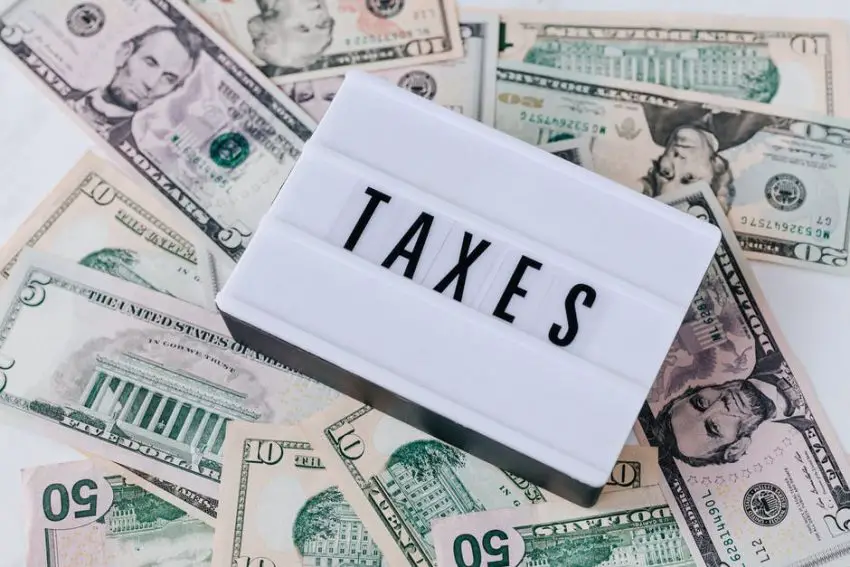Did you know that individual income taxes account for about half of the federal government’s total revenue? In the fiscal year 2021, that totaled almost $2 trillion!
But, knowing who pays income taxes and how much they pay isn’t so cut and dry. So, let’s explore who pays income taxes and the benefits of doing so. You’ll be surprised will some of the benefits we mention.

Contents
Who Pays Income Taxes?
All United States citizens and green card holders share the responsibility of paying income taxes. In addition, some non-immigrant visa holders must also pay income taxes if they meet the tax resident criteria.
You are a tax resident if you are present in the U.S. for at least:
- 31 days during the current year, and
- 183 days during the three-year period (current year and two previous consecutive years)
There are several exceptions to this criterion, but these are the basics of being an IRS tax resident for non-immigrant visa holders.
Yet, even though the income tax responsibility falls on citizens and visa holders, not everyone has to pay. The IRS sets a threshold to determine who must file a tax return each year. The threshold is set depending on your:
- Age
- Filing status
- Income
- Source of funds
The thresholds for the 2022 tax season range from $12,500 to $27,800.
Based on your category, if your gross income is at least the number listed, you will need to file a tax return for the 2022 tax season, which is due in April 2023.
The tax system is progressive. That means the percentage you pay is based on how much money you make. However, the thresholds for each tax bracket also change, so you may pay a different rate from year to year if your income varies.
The income tax brackets range from 10% to 37%.
Further, there are income taxes at the federal, state, and local levels. This article focuses primarily on paying federal income taxes.
Not all states have an income tax. Refer to your state’s department of revenue for more information on state taxes.
Contact your county’s or city’s treasury office to learn about local taxes. Local taxes vary greatly depending on your location.
Do Federal Employees Pay Taxes? Read this interesting Article.
Benefits of Paying Income Taxes
Paying your federal income taxes comes with many benefits. First and foremost, it’s your civic duty, and you’re legally required to pay your taxes.
Plus, if you don’t pay, you have an audit risk. An IRS audit is an examination of your accounts and financial information. The IRS wants to ensure you record your information correctly under tax laws.
The IRS selects audits using various methods, including:
- Random selection and computer screening
- Related examinations
Being selected for an audit doesn’t necessarily suggest a problem. Still, it’s a lengthy process you’ll have to endure, especially if you have a connection to someone else the IRS is auditing.
Paying your taxes correctly each year will give you peace of mind that you won’t get audited. And even if by the off chance you do, all your papers will be in order, so you’ll have nothing to worry about.
Let’s look at even more benefits of paying income taxes.
Credits, Deductions, and Refunds
The IRS offers different ways for Americans to lower their taxable income. A tax deduction is when you subtract an amount from your income. Some standard tax deductions include:
- Charitable donations
- IRA and 401(k) contributions
- Medical expenses
- Mortgage interest
A tax credit is a dollar-for-dollar reduction in your actual tax bill. Some credits are refundable, which means the IRS could owe you money. Some common tax credits are:
- Child tax credit
- Earned income credit
- Residential energy credit
Additionally, if you’re eligible, you may be able to receive a tax refund from the government after paying your income taxes. This is because sometimes Americans overpay how much they owe in taxes, which is especially true if you don’t claim any dependents.
After filing your taxes, the government will send back any extra money you’ve paid, which can amount to a considerable return.
Education
A significant benefit of paying income taxes is being able to send your kids to public school. In most states, education is mandatory until age 16, but in some states, it’s 18.
Although children don’t need to attend public school, during the 2020-2021 academic school year, nearly 50 million students attended public schools from prekindergarten to 12th grade. Compared to private schools and homeschooling, most children attend public school.
Your kids can attend elementary, middle, and high school for free with your tax contributions. In many instances, your kids can also receive free meals at school.
Emergency Services and Defense
Paying your local taxes helps cover the costs of first responder services, such as:
- Police
- Fire department
- Other emergency services
When you need these services, you’ll be able to call and receive them at no cost. The exception is calling an ambulance. The price of an ambulance depends on your health insurance.
Tax money also helps provide essential utilities, such as:
- Energy
- Waste management
- Water
Taxes help fund the military, national guard, and other defense services at the federal level.
Loan Approval
Filing and paying your income tax each year means you have access to easy home loans.
Home loans usually require you to submit proof of income because your income is an essential consideration for approval. Lenders will use your tax returns to confirm your income.
If you’re a business owner, you can also access easy business loans when you pay your taxes accordingly. Your tax returns will be integral in showing lenders how profitable your business is.
If your business isn’t profitable yet, your taxes will show lenders your current financial situation to understand when you will become profitable.
Anytime you need to show proof of income, especially to secure a loan, having your previous tax returns on hand will be helpful.
Research
Tax dollars provide funding for scientific and medical research. While private financing is available, government funding is essential. That’s because these are the only two primary funding sources for research.
Government research councils play a vital role in furthering research interests and securing patents for new discoveries and methods. Universities and specialized government agencies carry out government-funded research.
It’s most common for government research to relate to the social sciences and humanities than other fields.
Reliable Record
Filing your taxes each year is an easy way to establish yourself as a law-abiding citizen.
For visa holders, paying your taxes will go a long way when you want to get a green card or become a U.S. citizen. Tax returns provide a clear record of how long you’ve lived in the U.S. and that you’ve paid your dues.
It’s the best way to show your commitment to following the law and being a responsible citizen, should you want to become one.
Safe and Reliable Roads
The government uses tax dollars to build new roads and provide road maintenance. After all, the U.S. is known for its extensive road network. President Eisenhower enacted the Interstate Highway System in 1956 to connect U.S. cities of 50,000 or more.
But politicians at the time knew they couldn’t enact tolls outside of big cities, so they funded most of the project through fuel taxes. Today, taxes and tolls continue to pay for road maintenance and construction.
It’s no doubt the U.S. has experienced a decline in transportation maintenance since the enactment of the Interstate Highway System. But the 2021 Infrastructure Bill is an example of the government reigniting its commitment to infrastructure.
The $1.2 trillion bill will provide funding for:
- Roads and bridges
- Transit and rail
- Airports, ports, and waterways
- And much more
Income tax dollars also help fund national parks, recreational areas, and other places of enjoyment.
Social Security and Healthcare
The Federal Insurance Contributions Act (FICA) establishes a payroll tax that employers deduct from each paycheck. The self-employed make FICA payments quarterly to the IRS throughout the year when paying their income taxes.
Although it comes out of your income, FICA is different from income taxes because it explicitly funds Social Security and Medicare programs.
Those that don’t pay into Social Security or Medicare won’t be able to claim their benefits when they retire.
Aside from FICA, federal income taxes help fund many other government financial aid services. For example, programs like federal student aid, housing loans, and food stamps all use tax dollars.
There are hundreds of programs at the federal level and many at the state and local levels that use tax dollars to help Americans with financial assistance in times of need. The government often refers to these programs as welfare or safety-net programs.
Pay Your Taxes Accordingly
The question of who pays income taxes is not as important as what tax dollars do to help Americans. Not only are there personal benefits of paying your taxes, but there are many societal benefits as well.
Now that you have read our article, Who Pays Income Taxes, and What Are the Benefits? Are you Ready to learn more about taxes? We have plenty of information for you to read about in the Taxes section. Don’t forget to bookmark our page as we are always adding new content. You don’t want to miss anything!
Do you ever wonder Can I Mail my tax return in a regular envelope?
Read this article and learn more.
Learn More
Is a Student Loan Tax Deductible?
Is Cancellation of Debt ( 1099-C ) Income Taxable?
Do You Want to Apply Your Refund To Next Year’s Return?
Tax implications of Back Door IRA
19 Best Tax Deductions for Mechanics and Repair Shop Owners
Best Tax Write Offs for Dentists
How To Stop Child Support From Taking Tax Refund






2 thoughts on “Who Pays Income Taxes, and What Are the Benefits?”